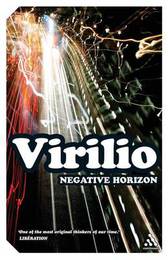
|
Negative Horizon: An Essay in Dromoscopy
Paperback / softback
Main Details
| Title |
Negative Horizon: An Essay in Dromoscopy
|
| Authors and Contributors |
By (author) Paul Virilio
|
|
Translated by Michael Degener
|
| Series | Continuum Impacts |
|---|
| Physical Properties |
| Format:Paperback / softback | | Pages:224 | | Dimensions(mm): Height 198,Width 129 |
|
| Category/Genre | Western philosophy from c 1900 to now |
|---|
| ISBN/Barcode |
9781847063069
|
| Classifications | Dewey:304.23 |
|---|
| Audience | |
|---|
|
Publishing Details |
| Publisher |
Bloomsbury Publishing PLC
|
| Imprint |
Continuum International Publishing Group Ltd.
|
| Publication Date |
2 June 2008 |
| Publication Country |
United Kingdom
|
Description
Negative Horizon is Paul Virilio's most original and unified exploration of the key themes and ideas running through his philosophy. Provocative and forceful, it sets out Virilio's theory of dromoscopy: a means of apprehending speed and its pivotal - and potentially destructive - role in contemporary global society. Applying this theory to Western political and military history, Virilio exposes a compulsion to accelerate, and the rise of a politics of time over territorial politics of space. In exposing what he believes to be the consequences of this constant acceleration for human sensory perception and, ultimately, global democracy, Virilio offers a vision of history and politics as disturbing as it is original.
Author Biography
Paul Virilio is one of our foremost cultural critics. Architect and urban planner and former director of the Ecole Speciale d'Architecture in Paris, he has written widely on film, architecture, art, war and technology. Julie Rose is a freelance translator and winner of the PEN Medallion for Translation. Paul Virilio is Director of the Ecole Speciale d'Architecture in Paris and author of over 15 books, including Art and Fear and Desert Screen.
Reviews'One of the most original thinkers of our time.' Liberation * Blurb from reviewer * 'Virilio writes on the edge of physics, philosophy, politics and urbanism.' New Statesman * Blurb from reviewer *
|